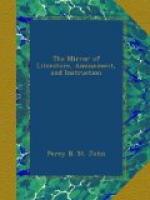“’These are four of my daughters. I have eight children. Francois, the keeper, has had four, and he has had the good fortune to get them all married. Francois is a kind father.’
“‘So,’ said I, ’twelve children then have been born in the Morgue. Dreams of joy, and conjugal endearments, and parental delights, have been experienced in this chamber of death. Marriage with its orange flowers, baptism with its black robed sponsors, the communion, and the embroidered veil, love, religion, virtue, have had their home here as elsewhere. God has sown the seeds of happiness every where.’
“’Papa, we are going to a distribution of prizes. My sisters are sure to get a prize. Don’t weary, we will be back in good time.’
“’Go, my children,’—and all four embraced him.
“I thought of the body of the little Norman in the dreary room beneath, and of the mother who even now, perhaps, was anxiously looking for her from the window.
“‘This is the apartment of Francois’. Francois did the honours with the activity of a man who is not ashamed of his establishment. His room is comfortably furnished; two modern pendules mounted on bronze, a wardrobe with a Medusa’s head, a high bed, and a handsome rose-coloured curtain. If the room was not overburdened with furniture, if there was not much of luxury, yet, to those not early accustomed to superfluities, it might even seem gay. It represented the tastes, opinions, and habits of its master. Vases of flowers threw a green reflection on the curtains, for Francois is fond of flowers. Among his gallery of portraits were those of Augereau and Kleber, both in long coats, leaning on immense sabres, with peruques and powder. Napoleon is there three times.
“‘Look at these jars,’ said Francois, ’these are sweetmeats of my wife’s making; she excels in sweetmeats.’ I read upon them, ‘gooseberries of 1831.’ We left Francois’s apartment which forms the right wing of the Morgue, while the clerk’s house is on the left, and entered the cabinet of administration of M. Perrin.
“If Francois is fond of flowers, M. Perrin has the same penchant for hydraulics and the camera obscura; he draws, he makes jets from the Seine, by an ingenious piece of machinery of his own invention; while he was retouching his syphon, I asked permission to turn over the register, where suicides are ranged in two columns.
“The fatal ‘unknown’ was the prevailing designation; ’brought here at three in the morning, skull fractured, unknown;’ ’brought at twelve at night, drowned under the Pont des Arts, cards in his pocket, unknown;’—’young woman, pregnant, crushed by a fiacre at the corner of the Rue Mandar, unknown;’—’new born child found dead of cold, at the gate of an hotel, unknown.’
“I said to M. Perrin that he must weary here very much occasionally during the long nights of winter.
“‘No,’ replied he good humouredly, ’the children sing, we all work, Francois and I play at draughts or piquet; the worst of it is, we are sometimes interrupted; a knock comes, we must go down, get a stone ready, undress the new comer and register him: that spoils the game; we forget to mark the points.’




